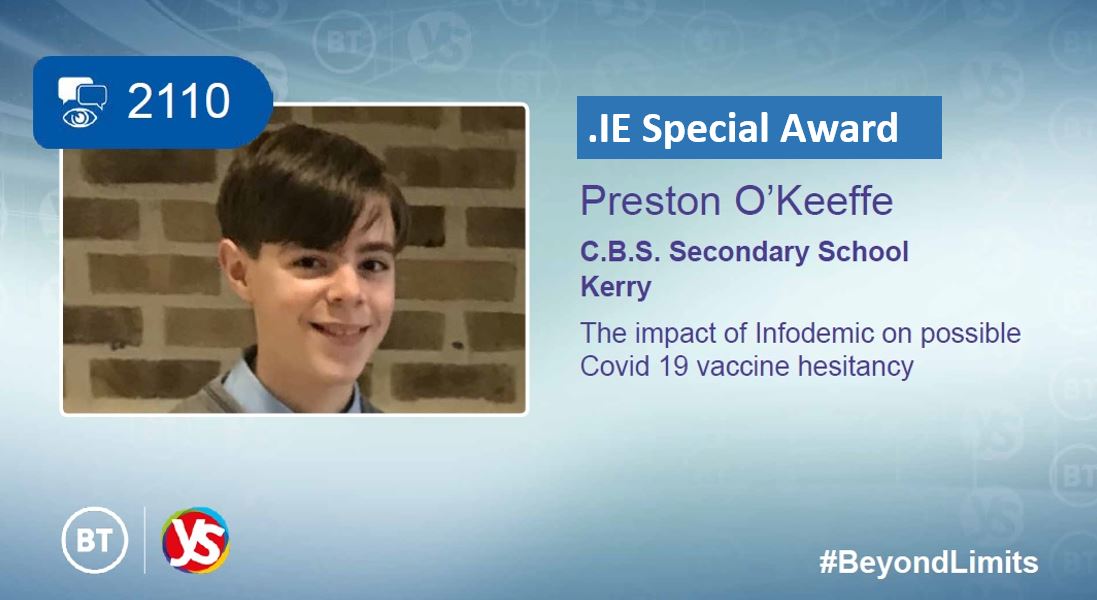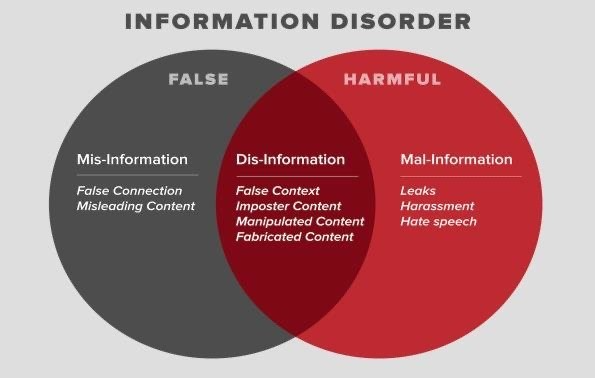BT Young Scientist & Technology Exhibition 2021: Winner of .IE Special Award
We are very proud to support the BT Young Scientist & Technology Exhibition and have done so each year for the past 10 years. It is important to us to acknowledge the excellent work undertaken by inspiring student competitors.
We were delighted that Preston O’Keefe of C.B.S. Secondary School Kerry won the .IE Special Award at the recent 2021 exhibition for his project ‘The impact of ”infodemic” on possible Covid 19 vaccine hesitancy’. Along with winning this award, Preston also won first place in the Junior category of the Social and Behavioural Sciences area.
It has been a dream of mine to compete in the BT Young Scientist. It has been a wonderful experience topped by winning both prizes.
Preston explained that the BTYSE awards meant a lot to him as he was the first second year in his school to get into BTYSE. Also, his project was aimed at helping people understand how important the infodemic is in the modern world and how easily it can be spread. It can also help people identify false information.
Preston kindly provided the Abstract from his project to give a summary of his study design, results, conclusions and recommendations.

Project Summary/Abstract
An Infodemic has so much information online and offline that people do not know what is true. It includes deliberate attempts to spread fake information and the accidental spread of fake information (WHO 2020c). The volume of information and the speed at which it was spread during spring of 2020, using social media as an amplifier has never been seen before (Elisabeth Wilhelm, WHO 2020d.). Due to the lack of objective guidelines and regulations in the area of social networking and internet usage, such information can be inaccurate, biased, and in the case of the current pandemic dangerous. On the 23rd of September Dr Clair O Brien of WHO and Mellissa Fleming of United Nations stated that there is evidence of “a huge Covid-19 vaccine hesitancy issue.” (World Health Organisation 2020f).
My hypothesis, if an individual has been exposed to the infodemic or not taken the flu vaccine in 2020 then they will be hesitant toward the COVID-19 vaccine when available.
In this study, convivence sampling was used to survey (n=1134) respondents. Results revealed that those with education status “completed primary” or “completed Junior Certificate” have higher average “infodemic scores” than all other. Those who claimed to be more vaccine hesitant were more likely to have higher infodemic scores.
An observable difference was seen between those who said they got the flu vaccine and those who said they would get the COVID-19 vaccine versus those who said they didn’t get the flu vaccine and those who said they would get the COVID-19 vaccine. Phi coefficient reveals Φ = -0.12 or a negligible relationship between those who answer yes to taking the influenza vaccine and those who agree that they would take the COVID-19 vaccine.
This study is based on the Irish context and provides some insights that may help public health officials to mitigate the impact of the current pandemic. Solutions are proposed based on (1) algorithmic and legislative regulations, (2) the role of trust in citizen engagement with national public health measures (3) lessons from psychological and behavioural science, (4) science communication strategies.
The infodemic could have a considerable impact on COVID-19 vaccine hesitancy. Building vaccine literacy must be a key priority, in advance, in rolling out the vaccine.

We look forward to another exciting BTYSTE exhibition in 2022!
Naomi Temple is our Marketing Specialist working within our corporate communications team.